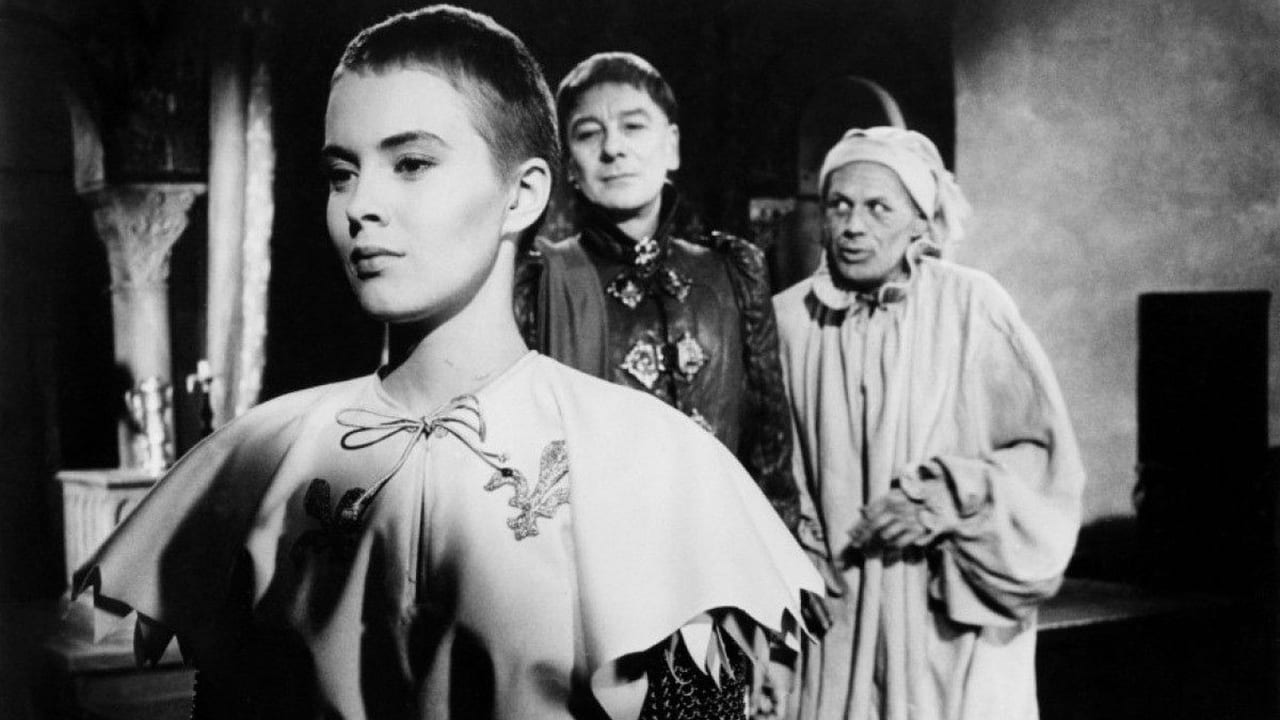




People are voting emotionally.
It's the kind of movie you'll want to see a second time with someone who hasn't seen it yet, to remember what it was like to watch it for the first time.
View MoreThe story, direction, characters, and writing/dialogue is akin to taking a tranquilizer shot to the neck, but everything else was so well done.
View MoreThe movie's not perfect, but it sticks the landing of its message. It was engaging - thrilling at times - and I personally thought it was a great time.
View MoreOtto Preminger's much-maligned version of Joan of Arc's inquisition and defeat came under critical scrutiny for, among many things, the casting of an unknown in the demanding leading role. Jean Seberg was touted as Preminger's discovery, and her youthful energy and doe-eyed rebelliousness are the right ingredients for the Maid of Orleans. What Seberg lacks is forceful projection--though, with so much talent surrounding her, one hardly notices. After promoting the foppish Dauphin as the next King of France, a simple but fierce country girl heads the French Army into battle against England; sadly, with her triumphs passed her and her usefulness run dry, she was turned over to the courts where she was declared a heretic, her talk of voices the ramblings of a demonic influence. Graham Greene adapted George Bernard Shaw's celebrated play, putting much of the emphasis on Joan's trial; still, one clearly senses Preminger's pithy hand in the playful framework complete with ghosts and a music-box score. The costumes are plushy, the sets passable, yet one longs for more involving action (there's the set-up for battle, but no fighting); without a grander design, a more florid visual scope, what we're left with is textbook history. Certainly the performances make the film worth-seeing, and Seberg shouldn't be counted out in this regard. Hers is an empathic reading and, while she isn't yet a riveting presence, the newcomer manages a connection with the material (translating it to the viewer) which many seasoned pros might have found unmanageable. **1/2 from ****
View MoreSavaged when it came out, this film now looks handsome and sounds great. A feast of intelligent thoughtful acting, from Gielgud, Kenneth Haigh, Harry Andrews and especially Anton Walbrook,and a moving central performance from the beautiful and incredibly young Jean Seberg. Preminger doesn't jump around and show off- his long slow takes encourage you to listen and reflect, and Graham Greene's script condenses Shaw without sacrificing complexity.The piece has the look of a made for TV movie, and is certainly studio bound but none the worse for that. Too many contemporary movies on 'historical' themes cannot resist dumbing down. What would Mel Gibson have made of the Maid? Many drooling shots of her on the rack probably, then crisping up on the BBQ as the flames take hold. Preminger does none of this. The burning is shown mainly through a guilt-stricken reaction. There are a few weak performances, but not enough to cause any serious damage. I caught this movie on TV and was not expecting to watch it through, but I was gripped . In our age of religious fundamentalism and sacrifice, Joan's story has unexpected resonance.
View MoreJoan of Arc is probably the most extraordinary character in French history.So introducing fantastic elements in the screenplay makes sense.There are so many mysterious things about the Maid of Orleans ,although,thanks to the manuscript of her trial,she 's the most known character of the Middle Ages.BUt this woman definitely eludes human Otto Preminger did not commit sacrilege when he showed Joan reappearing one night in Charles the seventh's bedroom ,with other dramatis personae:bishop Cauchon,Dunois and the soldier who made a cross for the heroine with two pieces of wood just before she died."They cleared your name" the king says "Can you unburn me?" she says.Robert Shaw 's vision of Joan is not unlike that of Jean Anouilh in "l'alouette":Anouilh ended his play on a glorious note:he demolished the stake and he brought back Joan in Reims cathedral.I sincerely believe that Otto Preminger's movie has been unfairly dismissed :in my native France,they say it's a static movie ,and however,I had never the impression to be watching a filmed stage production.To my mind ,it's the best Joan of Arc ,with the staggering exception of Dreyer's masterpiece ,of course,which will probably never surpassed.But all the others ,Bresson,Fleming,Rosselini,Besson (Besson???),Rivette ,et al,cannot hold a candle to Preminger:his Joan is a woman of flesh and blood and Jean Seberg (debut) had a strong presence .But the stand-out is definitely Richard Widmark :his fans won't recognize him,particularly in the sequences where he appears as the old king at the end of the road;but he gives a very fine portrayal of Charles the seventh ,probably outré -this king was finally a smart one :he knew when war had to give way to negotiation,which Joan could not understand.But watching Widmark the tough guy of many a western or a film noir playing hopscotch is just a joy.He easily outshines such luminaries as Jose Ferrer,in Fleming 's version or John Malkovich ,in Besson's video game.There are funny anachronisms:"this horse cost 16 FRANCS" (the franc came much later);or Joan calling Gilles De Rais "Bluebeard" :Charles Perrault ,admittedly inspired by De Rais ,wrote his fairy tale more than two centuries later.But it's not a problem:Joan will come back after her death,and she will know the whole French history ,because ,unlike her contemporaries,she's eternal.The relationship Joan/Dunois is wonderfully treated :it's some kind of love story ,and seeing the young maid mother him brings something romantic .One can regret a detail:it's not because she was afraid of prison for life that Joan was relapsed :it's because they took away from her her woman's clothes and thus forced her to dress up again as a man.It' minor ;Shaw's lines ,depicting these foolish things which Joan could not live without,if she were buried forever in a hole ,are deeply poetic.I say it again:one of the best films about Joan Of Arc.
View MoreHaving seen the Peter O'Toole version recently, I was ready to be awed by the smart writing in this version. Little time is spent on the fighting, which I prefer. Instead, we are shown all the many motives underlying both the French and English (who held Normandy) politicos and priests who put her to death. Even the worst hypocrite of them all, the archbishop, leaves us with the thought that "Of course, she was innocent. The innocent have always had to suffer for the ambitions of the mighty. She had no idea what she was saying, no idea of the implications of blasphemy or going against the church. Unschooled, she had no idea of what the church's stand on such matters even was."Preminger was true to the myths surrounding her death, and I appreciated the preview on the tape that showed the flames reaching up and burning her. Why? They used gas jets in the movie, and 2 of them were stopped up. Suddenly, the air pressure blew out the stoppage and the flames leaped up right on her. Thankfully for her, they didn't have to repeat the shot as it was SO realistic: she WAS being burned!! Pretty traumatic introduction for an Iowa girl to her new career of acting.John Gielgud performed outstandingly. He is the English politico who is orchestrating the show. He also makes the point that once you condemn someone to death, you don't want to be around to watch them die. You might shrink from your 'duty' the next time...not that such delicacies bother the soul of our would-be president. We Christians, even the most anti-Semitic have no problem with falling back on the Old Testament when it comes to capital punishment, even though it was overridden by Jesus' words. Bring on public executions like this little girl's. Smelling burnt flesh might bring us respectable folks to our souls' senses.The only little 'pick' I have about this film is that we are not shown why the priest who has been so adamantly urging her burning becomes so suddenly so contrite, even to the point of madness. There should have been more expansion of his character, more dialogue--as the sudden 'coming to his senses' doesn't make sense.And, whether Graham Greene does this deliberately or not, St. Joan is such a self-assured little upstart, you almost but not quite, are glad she meets her come-uppance. And, when she turned down life in prison, for some reason I thought of Anne Sexton, the poet who accused Sylvia Plath of 'stealing her death' when she committed suicide ...knowing such an action guarantees immortality. You gotta wonder!!If ever there was a good example of obsessive thought and logic-tight compartments, this is one. St. Joan should have turned Buddhist and quieted the 'voices in her mind'.
View More